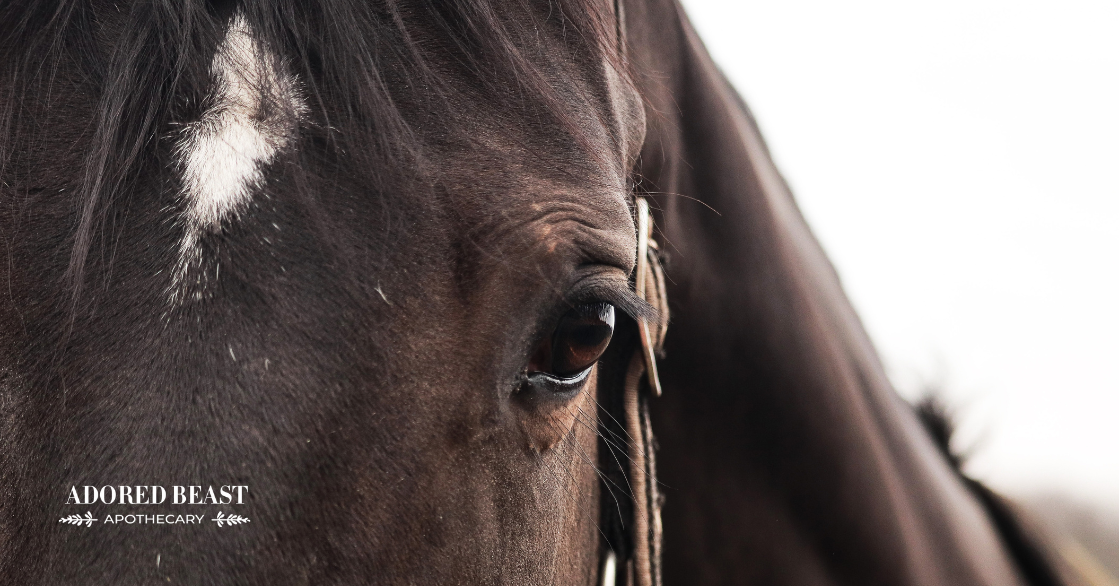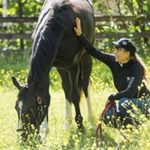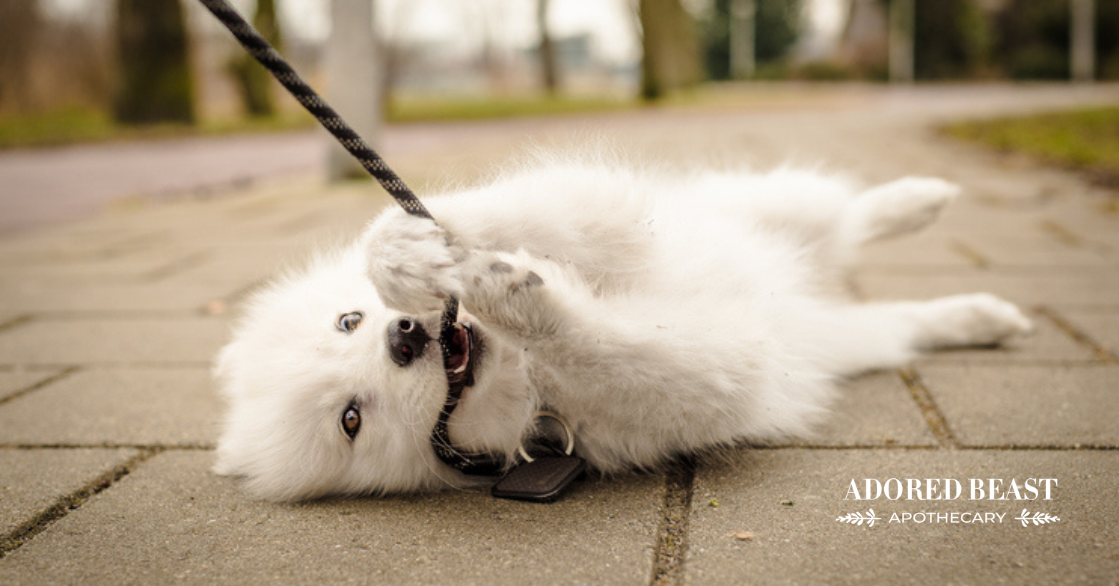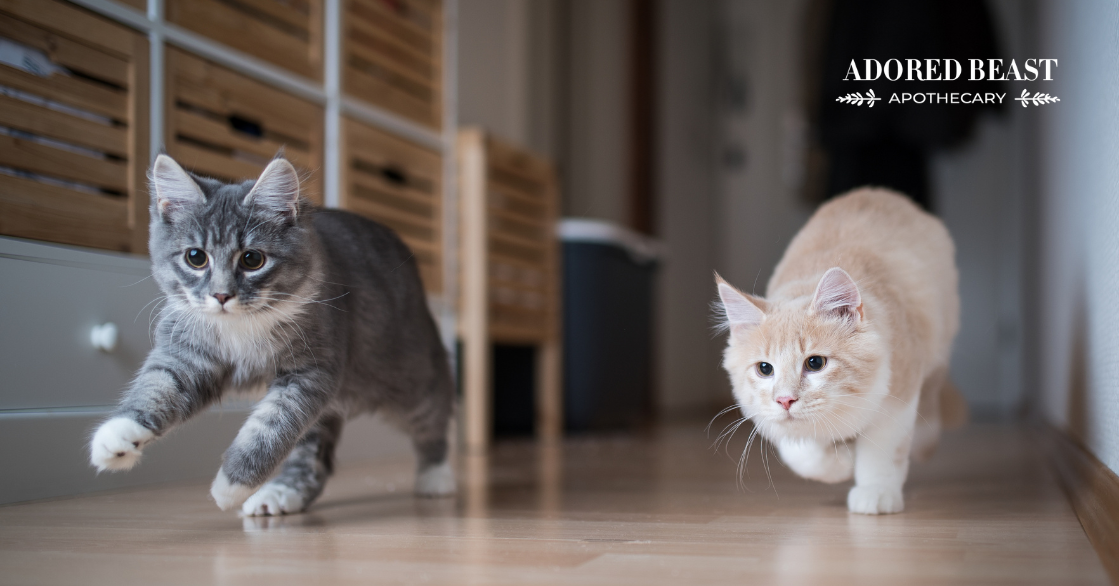Well, I’m back on the subject of poop once again! This time, we’re talking about the frustrating issue of free fecal water syndrome (FFWS) in horses. While we know this is not a life-threatening problem, it can have some unfortunate consequences in the wrong situations.
It can also be a red flag that something isn’t right in the gut microbiome so there might be some adjustments you need to make in order to resolve the issue.
To top it all off, it’s messy! Horse owners spend a lot of time cleaning their horse’s tail and legs – fecal matter can cause skin irritation if not washed off in a timely fashion.
So, let’s talk about this not-so-pleasant topic in terms of what it is, what to be aware of, and what you can do to address it.
What is Free Fecal Water Syndrome?
Free fecal water syndrome (FFWS) is a condition where large amounts of water are expelled from the bowel before, during, or after manure is passed.
On any given day, horses have approximately 70 litres of water in their gastrointestinal tract and need to drink roughly 30 litres of water to stay healthy. Water also comes from forage – around 10-15% from hay and up to 75-80% from pasture. Daily, horses move large amounts of water (about 100 liters) through the GI tract. When they are exercising, your horse needs more water in order to keep the body hydrated and also when it’s very hot or very cold outside.
FFWS affects your horse’s ability to stay hydrated, and this can be a big problem over the long term, putting stress on the kidneys, the liver, and all the other cells in the body. This is tenfold if we are talking performance horses who sweat and lose more water and electrolytes from exercise.
Factors in the Development of Free Fecal Water Syndrome
While the exact cause of fecal water syndrome is unknown, the hypothesis is that the root of the issue lies in a microbiome imbalance in the bowel that causes water to be expelled incorrectly. Other risk factors for the development of this disease include diet, genetics, metabolism, and environment.
Recent research shows that horses with this issue do not appear to have a significantly different microbial community in their bowel compared to horses that do not have FFWS, but that when fecal transplantation was performed, the symptoms improved. (1) What this tells us is that the microbes that the scientists are able to test for are most likely not the microbes involved in the development FFWS. The microbes (or lack thereof) that contribute to FFWS are most likely lesser-known strains that the scientists are not able to test for yet.
(Keep in mind that microbiome testing is still in its infancy and scientists can only create a test for a KNOWN strain of bacteria. When it comes to unknown strains, they can’t test for this until they identify and isolate the new strain. There are thousands, if not millions of strains that have yet to be identified, classified, and understood (in terms of function) in the equine GI system.)
In my personal experience, many horses that go from 100% hay diets to having access to some pasture forage in their diet improve in their symptoms of FFWS. This most likely also has to do with new access to microbial strains found in the soil and living plants. One of my horses struggled with FFWS for several years during the winter months when he had limited pasture access. Research shows that microbiome diversity is higher in horses that have pasture access rather than a dry hay diet. The dry matter (decrease in moisture content) also had a direct effect on the microbial community in the gut (2)
The health of tight junctions (the protein links between gut cells that hold the cells together and help them communicate and function correctly) of the bowel lining might be another factor in the development of FFWS. When the tight junctions break apart (also known as leaky gut syndrome), it may contribute to FFWS. Dietary, drug or mental stress can all contribute to the breakdown of the tight junctions. (3)
Breed and sex also seem to play a role in the risk for development of FFWS, with paint horses and geldings being more susceptible. (4) This could be related to the affects that hormones and metabolism have on the microbiome. Social stress (being low on the totem pole) also seems to contribute to FFWS.
Not Immediately Life Threatening But…
Medical professionals tell us that FFWS is a non-life threatening condition.
However, it can have some serious consequences over the long term, mainly systemic dehydration. For horses in heavy work or living in hot climates, it’s more problematic due to their higher water requirement. Horses that lose large amounts of water regularly may be more susceptible to kidney stress and colic. (5)
So, while the FFWS itself may not be life-threatening, the impacts of it may be more detrimental.
What You Can Do
There are several things that you can to to improve symptoms of free fecal water syndrome.
1. Address the Diet
The most effective solution I’ve found (and that science is finding too) is to diversify your horse’s access to fibre. (3) This means trying a wide variety of fibre combinations and making sure your horse has access to many types of fibre and some live pasture to allow them the change to re-balance their microbiome. In my opinion, the more fibre sources, the better.
Another very important factor is to ensure that your horse has a balanced diet free of glyphosate (aka RoundUp) which can not only alter the microbiome but also interfere with the GI lining tight junctions.
Dietary moisture is important for increasing the digestibility of food while also helping to hydrate your horse if they are losing water. Offering high-fibre/low sugar/high moisture mashes can really help to increase gut function and health.
Overall diet has a profound effect on the microbiome (6) so honouring the horse’s natural dietary requirements will clear up the picture so you can see how you might need to tweak things over time to help your horse.
2. Probiotics Please!
Probiotics can also be useful for increasing the production of short-chain fatty acids that help to maintain and repair GI tight junctions. Make sure you provide as many probiotic strains as possible along with a diverse fibre profile in order to help the gut bugs do their job correctly.
3. Be Sure Your Hay is Quality!
Since forage is the number one food source in your horses’ diet, make sure it’s high quality. If you’re not sure how to check, read our Know Your Hay blog.
4. Consider Limiting Your Deworming Medications
Worming often and unnecessarily has a negative effect on the gut lining and the microbiome. These drugs are toxic and you should only use them with extreme caution. Consider doing fecal sample testing and regular body condition assessments rather than blindly deworming your horses. For more information on the negative effects, check out this article.
5. Avoid Antibiotics
Antibiotics like metronidazole are widely use in diarrhea cases but can actually cause more harm than good, killing the microbiome and increasing risk of gut dysbiosis. If your horse has FFWS, avoid antibiotics like the plague. Even for other ailments, try to employ alternative treatments that don’t involve antibiotic drugs.
Types of Healthy Fibre
There are a wide range of healthy fibres that you can give your horse access to. I like to think of it as adding those missing puzzle pieces that they would have access to in a natural setting. In our more modern management techniques, we lose the plant diversity that horses have evolved to function with, limiting their plant access to dead grasses with maybe only a handful of grass species. Horses access hundreds of plants in a natural setting and they require more than just dried hay to maintain a healthy gut. In a perfect world, a healthy, biodiverse pasture is the best way to help your horse combat microbiome imbalance, but when that’s not possible, we need to bring the diversity to them. Below are my favorite plant fibres to add to the equine diet for FFWS. Organic sources should always be used.
- Non-GMO (Glyphosate-free)/Molasses-Free Beet Pulp – most of this will be imported from foreign countries other than Canada and the US because conventional North American sugar beet farming practices include huge volumes of glyphosate input. Follow the links to find it in Canada and the USA.
- Dandelion Leaf – a huge part of the natural equine diet and a total must for overall health of the gut and the entire body. Feeding (1000lbs): 1-2 cups of dried herb daily is ideal.
- Dandelion Root – another highly beneficial herb with unique fibre. Feeding (1000lbs): ½ cup daily of dried herb.
- Red Clover – naturally-occurring forage that gets missed with an all-hay diet. Feeding (1000lbs): ½-1 cup daily dried herb.
- Rose Hip – rich in antioxidants and prebiotic fibre. Feeding (1000lbs): I like to use the powder for high digestibility – 1-2 tbsp daily.
- Slippery Elm Bark Powder – extremely well-studied as a prebiotic fibre and for benefits in gut lining repair (ulcers). Feeding (1000lbs): 1620-3240mg daily.
- Marshmallow Root Extract (4:1) – high in mucilage fibre and gut-reparative. Feeding (1000lbs): 1000-1500mg daily
- Psyllium Husk Fibre – a powerhouse when it comes to firming up feces and contributing to microbiome health. Psyllium fibre resolved my own horse’s FFWS symptoms and he has been clear for an entire year with only 12 weeks of feeding psyllium fibre at the beginning of that year. Feeding (1000lbs): 125 grams daily for 8-12 weeks and then assess.
Addressing free fecal water syndrome in horses can take a little investigating and a little effort, but in the long-run your horse will thank you!
References
- Animals Journal: Free Fecal Water: Analysis of horse faecal microbiota and the impact of faecal microbial transplantation on symptom severity, 2021
- Animals Journal: Seasonal variation in the faecal microbiota of mature adult horses maintained on pasture in New Zealand, 2021
- The Horse: Free fecal water syndrome in horses and what to do about it, 2022
- Journal of Equine Veterinary Science: Field study on risk factors for free fecal water in pleasure horses, 2016
- Preventative Veterinary Medicine: Risk factors for colic in the Michigan (USA) equine population, 1997
- Plos One: Characterization of the faecal bacterial community in adult and elderly horses fed a high fibre, high oil or high starch diet using 454 pyrosequencing, 2014












![[RESEARCH] Is Herbicide Safe for Dogs?](https://blog.adoredbeast.com/wp-content/uploads/2025/06/herbicides-safe-for-dogs-103x55.png)